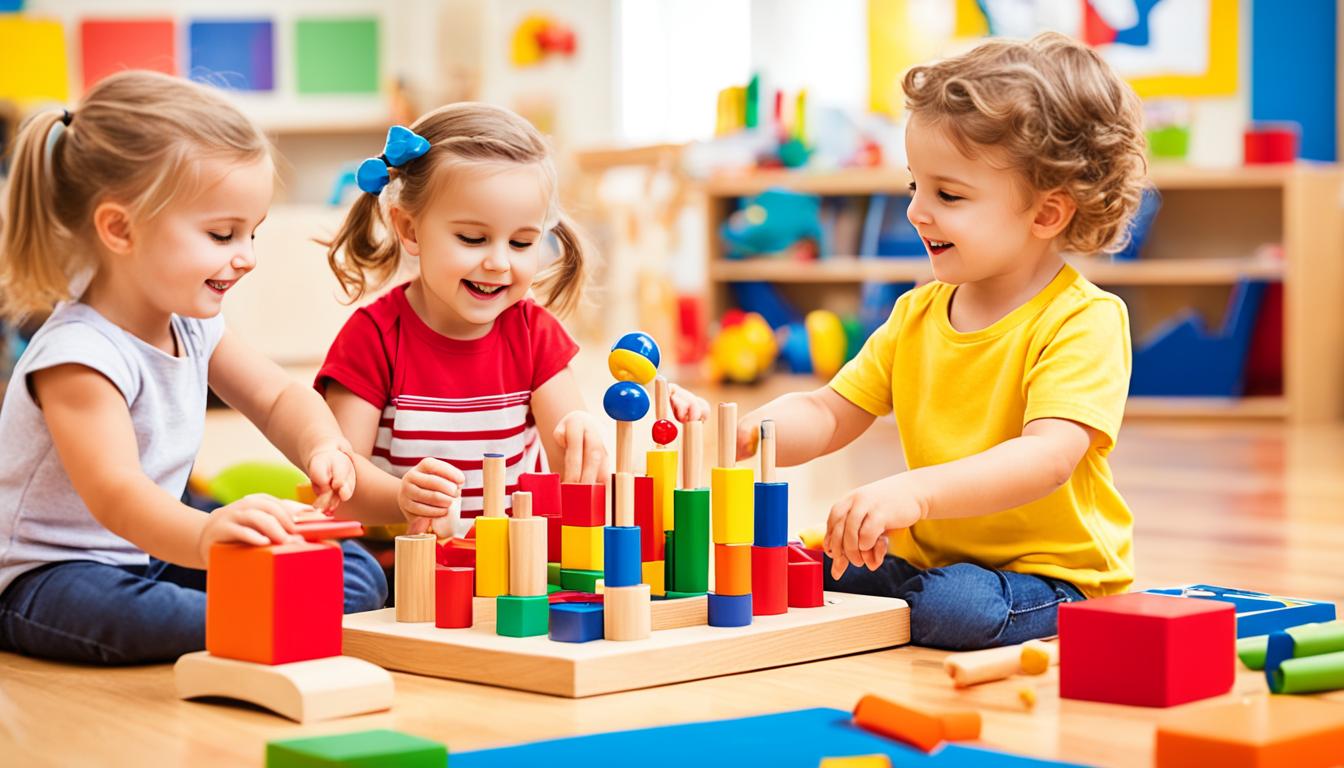
Key Skills for Early Childhood Training: Enhancing Educational Quality
As an early childhood trainer, I understand the crucial role that training plays in enhancing the educational quality of young learners. The early years of a child’s life are an incredibly important time for learning and development. By possessing key skills and competencies, trainers can provide a nurturing and inclusive learning environment that supports the holistic growth of young children.
Effective communication is one of the essential skills for early childhood trainers. By utilizing both verbal and non-verbal communication, trainers can effectively interact with children, parents, and colleagues, fostering positive relationships and collaboration. Additionally, classroom management skills are crucial for maintaining a structured and engaging learning environment that promotes optimal learning outcomes.
Moreover, a deep understanding of child development is vital for tailoring educational activities and strategies that meet the unique needs of young learners. By aligning curriculum planning with the developmental milestones of children, trainers can create age-appropriate lesson plans that facilitate learning and growth. Observational and assessment skills are also necessary for monitoring children’s progress, identifying areas of improvement, and providing targeted support.
By cultivating these key skills, early childhood trainers can significantly impact the educational quality of young learners. Through high-quality training, we can foster a love for learning, promote positive social interactions, and provide enriching educational experiences that lay a strong foundation for future academic success.
Key Takeaways:
- Effective communication is essential for early childhood trainers to interact with children, parents, and colleagues.
- Classroom management skills are crucial for maintaining a structured and engaging learning environment.
- A deep understanding of child development allows trainers to tailor educational activities and strategies to meet the unique needs of young learners.
- Curriculum planning skills are necessary for designing age-appropriate lesson plans.
- Observation and assessment skills enable trainers to monitor children’s progress and provide targeted support.
Importance of Early Childhood Training
Early childhood training is crucial for laying the foundation of a child’s future educational journey. During the early years of life, children possess a remarkable ability to absorb information and develop essential skills. Effective training during this critical period has a profound impact on their educational quality, cognitive abilities, social skills, and overall well-being.
Research has shown that early childhood training significantly influences a child’s future academic success. High-quality training programs provide young learners with the necessary tools to thrive in their educational pursuits. Trained early childhood educators play a crucial role in fostering a love for learning, promoting positive social interactions, and tailoring educational experiences to meet the unique needs of young learners.
By engaging in early childhood training, educators gain valuable knowledge and expertise in child development, curriculum planning, and classroom management. This enables them to create a nurturing and inclusive learning environment that supports the holistic development of children. Moreover, such training empowers educators to effectively communicate with children and their families, strengthening the partnership between home and school.
“Early childhood training provides a solid foundation for a child’s educational journey, equipping them with the necessary skills and knowledge for future success.”
By investing in early childhood training, educational institutions prioritize the educational quality of young learners and set them on a trajectory for success. Quality training programs ensure that educators possess the essential skills needed to cultivate young minds and provide enriching educational experiences.

Table: Comparison of Educational Quality with and without Early Childhood Training
| Aspect of Educational Quality | With Early Childhood Training | Without Early Childhood Training |
|---|---|---|
| Cognitive Development | Enhanced through targeted learning activities that stimulate critical thinking and problem-solving skills. | Development may be hindered, potentially leading to academic delays and reduced cognitive abilities. |
| Social Skills | Fostered through positive interactions, collaborative play, and social-emotional learning opportunities. | Social skills may be limited, impacting peer relationships and overall social development. |
| Language Development | Supported through language-rich environments and structured language learning experiences. | Language acquisition may be delayed or less comprehensive, affecting communication skills. |
| Emotional Well-being | Promoted through nurturing environments that prioritize emotional support and resilience-building. | Emotional well-being may be compromised, potentially leading to difficulty managing emotions and challenges. |
Early childhood training equips educators with the knowledge and skills to provide high-quality education that benefits young learners in various aspects of their development. By embracing the importance of early childhood training, educational institutions demonstrate their commitment to enhancing the educational quality of young children and setting them up for success in their future educational endeavors.
Essential Skills for Early Childhood Trainers
Effective early childhood trainers possess a diverse set of essential skills that are vital in creating an optimal learning environment for young children. These skills play a crucial role in enhancing the educational quality and overall development of young learners.
One of the key skills for early childhood trainers is effective communication. They must have the ability to communicate effectively with children, parents, and colleagues. Verbal and non-verbal communication techniques are employed to interact with young children, ensuring clear and meaningful communication that promotes learning and understanding.
Another critical skill for early childhood trainers is classroom management. A positive and structured learning environment is essential for young children to thrive academically and socially. Trainers must establish and maintain a well-organized and disciplined classroom setting that fosters engagement, cooperation, and mutual respect among children.
Extensive knowledge of child development is a fundamental skill that early childhood trainers must possess. Understanding the stages of physical, cognitive, social, and emotional development allows trainers to design educational activities and strategies that align with the unique developmental needs of young learners. This knowledge helps create age-appropriate learning experiences that support their overall growth.
Curriculum planning skills are essential for early childhood trainers to design engaging and age-appropriate lesson plans. Trainers must have the ability to develop a curriculum that encompasses a wide range of subjects and activities that facilitate the holistic development of young learners. These plans should be designed to stimulate curiosity, creativity, critical thinking, and problem-solving skills.
Lastly, early childhood trainers must possess strong observation and assessment skills. Regularly monitoring the progress of children allows trainers to identify areas of improvement and provide targeted support. Through careful observation and assessment, trainers can tailor instruction to meet the individual needs of each child, ensuring educational quality and fostering continuous growth.
In summary, early childhood trainers require a diverse range of essential skills to provide high-quality education and enhance the educational quality of young learners. Effective communication, classroom management, knowledge of child development, curriculum planning, and observation and assessment skills are all crucial in creating a nurturing and inclusive learning environment that optimizes the potential of young children.

Essential Skills for Early Childhood Trainers:
| Skills | Descriptions |
|---|---|
| Effective Communication | Ability to communicate effectively with children, parents, and colleagues through verbal and non-verbal means. |
| Classroom Management | Establishing and maintaining a positive and structured learning environment that fosters engagement and cooperation. |
| Knowledge of Child Development | Understanding the stages of physical, cognitive, social, and emotional development to create age-appropriate learning experiences. |
| Curriculum Planning | Designing engaging and age-appropriate lesson plans that stimulate curiosity, creativity, and critical thinking. |
| Observation and Assessment | Monitoring children’s progress, identifying areas of improvement, and providing targeted support. |
Conclusion
Early childhood training plays a significant role in enhancing the educational quality of young learners. By cultivating key skills such as effective communication, classroom management, knowledge of child development, curriculum planning, and observation and assessment skills, early childhood trainers can create a nurturing and inclusive learning environment.
These skills are essential for providing high-quality education that supports the holistic development of young children. By investing in early childhood training and ensuring trainers possess these key skills, educational institutions can lay a strong foundation for young learners, setting them on a path to success in their future educational journey.
With early childhood training, educators empower themselves to make a positive and lasting impact on the lives of young learners. By keeping a focus on educational quality and continuously developing the key skills necessary, trainers can provide the best possible learning experience for children in their early years.
FAQ
What is early childhood training?
Early childhood training refers to the specialized education and development of individuals who work with young children, typically from birth to age eight. It involves acquiring the necessary skills and knowledge to provide high-quality education and support for young learners.
Why is early childhood training important?
Early childhood training is important because it sets the foundation for a child’s future educational journey. It helps enhance the educational quality of young learners by developing their cognitive abilities, social skills, and overall well-being.
What are the key skills for early childhood trainers?
The key skills for early childhood trainers include effective communication, classroom management, knowledge of child development, curriculum planning, and observation and assessment skills. These skills are essential for creating a nurturing and inclusive learning environment for young children.
How does early childhood training enhance educational quality?
Early childhood training enhances educational quality by equipping trainers with the skills and knowledge needed to create a nurturing and inclusive learning environment. By cultivating effective communication, classroom management, and observation and assessment skills, trainers can provide high-quality education that supports the holistic development of young learners.